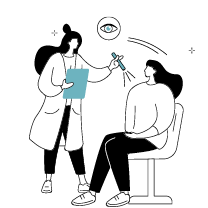
Advancing Eye Care and Supporting Our Team

The ECP Foundation, formerly known as the ECP CAREs Foundation, is a dedicated charitable organization that furthers the mission of EyeCare Partners (ECP).
Our mission is to support ECP team members during times of crisis, provide eye care services to the underserved communities we serve, and educate today’s and tomorrow’s eye care professionals.
This mission is carried out through three impactful programs:
ECP CAREs

ECP GIVEs
ECP EDUCATEs
ECP CAREs:
Supporting Our Team in Times of Need
ECP CAREs is an internal program of the ECP Foundation dedicated to supporting EyeCare Partners employees in need. It provides assistance to team members facing financial hardship due to disasters (such as floods, tornadoes, earthquakes, or house fires) or personal crises (including extended illness, injury, domestic violence, or sudden property loss). Funded by employee donations, this program fosters a supportive community by offering grants to those in need.
How to Donate:
ECP CAREs thrives through the generosity of EyeCare Partners team members. Donations can be made via automatic payroll deductions or as one-time contributions. All donations are tax-deductible, and contributors will receive a tax form at the end of the year. Every contribution—big or small—makes a meaningful difference.
How to Apply:
Active ECP employees with at least 30 days of service are eligible to apply for financial assistance if the hardship occurred while employed at ECP and within the past three months. A diverse panel carefully reviews applications to ensure timely and thoughtful responses. To apply, fill out the form below.

ECP GIVEs:
Expanding Access to Sight-Saving Eye Care
ECP GIVEs ensures that quality eye care is accessible to underserved populations in the communities we serve. Through this program, ECP-affiliated practices provide routine eye care and free sight-saving surgical services to indigent patients who meet federal poverty guidelines in their state and have no insurance. By bridging the gap in access to essential care, we empower vulnerable individuals to live healthier, more fulfilling lives.
ECP EDUCATEs:
Advancing Education in Eyecare
ECP EDUCATEs reflects our commitment to shaping the future of eye care through education and professional development. By supporting residents, fellows, and continuing education programs, we empower the next generation of eye care professionals with the knowledge and skills needed to provide exceptional patient care. Through hands-on training and mentorship opportunities, we are investing in the future of our industry—because when we educate, we elevate.

A Nationwide Impact
ECP CAREs Frequently Asked Questions
What are examples of Eligible Hardships Considered by ECP CAREs?
- To qualify for assistance, team members must be employed by ECP for at least three months. Examples of eligible hardships include:
- Serious illness of a team member or dependent (beyond a common cold) resulting in significant medical expenses exceeding insurance coverage.
- Loss of property due to fire or natural disaster that is not covered by insurance.
- Funeral expenses for a dependent or immediate family member.
- Personal expenses incurred due to domestic violence.
- Loss of income due to an unforeseen crisis (e.g., extended medical leave without PTO/disability coverage).
What are examples of ineligible expenses that will not qualify for a grant by ECP CAREs?
- Insurance deductibles, premiums and co-pays
- Evictions and or repossessions
- Legal/Court fees/fines, bail
- Adoption fees or expenses associated with divorce or child custody issues
- Bad debts/loans/overdue bills from ongoing financial issues
- Job loss or reduction of work hours/pay
- Car maintenance, registration
- Elective medical procedures
- Student loans or educational expenses
- Pet-related expenses (unless they’re directly tied to a medical emergency)
Who decides eligibility for the grant?
Members of the ECP CAREs review panel, made up of a team of diverse ECP teammates from across all facets of the company, decide eligibility for the grant on a case-by-case basis. Examples of eligible and ineligible hardships and expenses are listed above, but these are not exclusive lists. The review panel may determine other hardships and expenses that may or may not qualify based on various factors, including the needs of applicants and the amount of available funds.
What is the maximum grant award?
The maximum award will not exceed $2,500. Grant amounts will vary on a case-by-case basis, determined by factors such as the need, the impact of the qualifying event on the team member, and the availability of funds within the program at the time of application. Grants will be allocated primarily to those facing the most significant financial burden.
Is this a loan? Do I need to arrange to pay the money back?
No, if you receive a grant from ECP CAREs, repayment is not required. ECP CAREs is funded by the generosity of team members who want to support their coworkers during challenging times.
Will I be taxed if I receive a grant from the ECP CAREs?
No, grants from ECP CAREs are tax-free and will not be included in your overall gross income.
My spouse and I both work for the company; can we both apply for assistance?
No, only one employee per household may apply for assistance within a 1-calendar-year period.